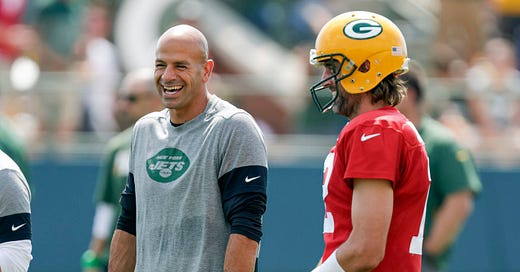Packers’ Leverage In Rodgers Trade Negotiation Is Jets’ Historical Stupidity
The latest game show making the rounds between mainstream and social media is “Who Has More Leverage?!” now that Green Bay’s future Hall of Fame quarterback Aaron Rodgers announced on Tuesday’s Pat McAfee’s show that he “intends” to play for the Jets during the 2023 NFL season.
Is it the Jets, who would finally boast a QB capable of ending a 12-year playoff drought, the NFL’s longest current streak? Or is it the Packers, who are allegedly holding out for the best possible return package?
The winner, of course, is neither. The Jets have almost no recourse should they be unable to come to an agreement as to the trade compensation necessary to complete a trade that would allow them to relegate 2021 Draft bust Zach Wilson to clipboard duty. The free agent class is all but wiped out and 2023 Draft gurus don’t believe Gang Green will be able to find a starter with their No. 13 overall pick, at least not one who could step in right away.
As for Packers, how long are they willing to play this game of chicken for a player they have all but directly cast aside in the public domain? They have strongly hinted that they are ready to commence the Jordan Love era this season, so paying Rodgers’ enormous contract obligations isn’t a sound management plan.
Rodgers is due a $58.3 million “option bonus” plus a $1.165 million base salary if he’s on Green Bay’s roster this season, with a $31.6 million salary cap hit. Even if all this kerfuffle motivates Rodgers to retire, the dead money cap hits would total over $40 million (which can be split over two seasons if designated post June 1).
Though Rodgers’ payment schedule hasn’t been disclosed, reports indicate that the bonus won’t be due prior to April’s Draft. Still, as Jason Fitzgerald from Overthecap.com noted, there is nothing optional about it. That means Green Bay’s only play is to offload as much of the obligation as they can to establish cost certainty for the upcoming season.
Ergo, neither side has much of a leverage advantage--in theory. However, we’re talking about the Jets, who have a history of doing impulsive, dumb things. Their owner, Woody Johnson, would be humiliated and castigated by the fan base and the media for failing to acquire the veteran QB he promised if a Rodgers trade isn’t consummated. Their General Manager, Joe Douglas, has to believe his long-term hold on his job would become tenuous if his club posts another noncompetitive campaign in 2023. He already has a record of reaching for players by trading up in Drafts and overbidding in the free agent market for those at nonpremium positions. Imagine what he’d be willing to do for a QB, even if it’s for just one season.
The Jets have already shown their dimwittedness by not having a deal in place with Green Bay BEFORE they went to woo Rodgers. I find that inconceivably naïve, but I have to believe it’s true, because if the Packers did indeed renege on the terms a la the film “Draft Day”, to which I referred in my last post in a half-joking manner, I would have the leaked the hell out of it to make them look bad and anger Rodgers.
No one really knows how far apart the two sides are at this point. Rumors suggest that Green Bay is looking for at least that 2023 first-round pick for the 39-year old Rodgers, while the Jets would obviously counter with more of a conditional package based on Rodgers’ performance over his tenure with the club. Though not exactly the same situation, it only cost New York one conditional pick (which turned into a third-rounder) for Green Bay’s 39-year old QB Brett Favre in August 2008. The timing and financial maneuvering would obviously impact what a Rodgers trade would look like in the end, but it’s not unreasonable for the Jets to use the Favre deal as a baseline.
Though it is preferable for the Jets to get Rodgers into their building as soon as possible to get him acclimated to the program, it isn’t of the highest urgency. Veteran players like Rodgers often skip voluntary organized team activities, as he did last season in Green Bay. The mandatory minicamp is usually in mid-June.
That’s why, in my opinion, New York gains more of an advantage the longer this impasse continues. The Jets should make their draft picks at the end of April and then see where they stand.
The only concerning roadblock to that plan is whether the Jets are smart enough to execute it. (Shudders)



